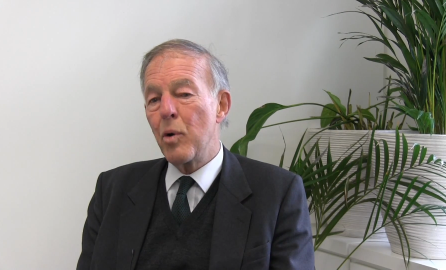Roger Martin, chairman of the UK charity Population Matters, says human beings’ impact on the environment depends on two factors: the average ecological footprint of each person, multiplied by the number of people. While the world focuses on how to reduce the former, Mr Martin believes scant attention is being paid to the latter.
Population Matters engages in education, research, lobbying and campaigning designed to bring attention to the implications of the world’s population growing to between 8 billion and nearly 11 billion by 2050.
The greatest growth is anticipated in Asia, and Africa where the population is expected to double to 2.4 billion. There will also be 270 million more people in the Americas, though the population of Europe will fall by 14 per cent to 726 million, according to a recent United Nations report.
At the same time, older people are set to make up a growing proportion of the world’s population. And ageing is now occurring fastest in the developing world.
By 2050, 80 per cent of the world’s older people will live in developing countries, according to the UN Population Fund (UNFPA). In its report, Ageing in the Twenty-First Century: A Celebration and a Challenge 2012, UNFPA argues that this older generation should not be seen solely as a burden, but as “a growing reservoir of talent and experience that can be tapped to reap a ‘longevity dividend’.”
"The problem,” according to philanthropist Bill Gates, “is that the population is growing the fastest where people are less able to deal with it. It's in the very poorest places that you're going to have a tripling in population by 2050."
This increased demand for services risks blunting the effects of aid to developing countries.
A recent report sponsored by Population Matters from a London School of Economics graduate student found increasing population size (driven by high fertility rates) was the main reason behind the absolute number of people living in poverty increasing in the 20 highest fertility countries in the past 30 years, despite more people receiving aid.
Mr Martin argues more investment is needed in family planning, which currently receives only 0.31 percent of total aid.
He says people may not use contraception for cultural reasons, such as men wanting to show their virility by having many children. He gives the example of a pilot project in Niger where a travelling clinic not only gives women a contraceptive injection effective for 12 weeks, but also talks to men about the consequences of having more children than existing health, education and land resources can support.
“This is working really rather well but it hasn’t been rolled out because there is a taboo in the UN about talking about it. [The] UN and others have simply marginalised the population issue as a sub-set of health.”
Mr Martin argues this neglects the negative impact of unchecked population growth on agricultural output, employment, infrastructure, security, and energy supply.

In a 2011 speech to the Royal Society of Arts in London, naturalist Sir David Attenborough said:
“I meet no one who privately disagrees that population growth is a problem. No one - except flat-earthers - can deny that the planet is finite... So why does hardly anyone say so publicly? There seems to be some bizarre taboo around the subject.”
“It has been politically incorrect for a very long time,” said Jane Goodall, a UN Messenger for Peace, in 2007. She said mushrooming population growth had led to deforestation and “harm not just for the animals and the environment but the humans living there too, no question”.
Dr Goodall said controversy had been stoked by the term “population control”.
“That’s really what got to people,” she said. “They don’t want to be controlled. And then there is the Catholic Church...”
The encyclical Humanae Vitae (Human Life), written by Pope Paul VI in 1968, excludes “any action which either before, at the moment of, or after sexual intercourse, is specifically intended to prevent procreation...”
Mr Martin is hoping the new Pope Francis will reconsider this teaching, which he says has had a hugely negative impact, particularly in the Philippines where 8 in 10 people are Catholic.
However, as Population Institute President Bill Ryerson explained in an interview last year, the religious obstacles to tackling population growth are not limited to the Catholic Church.
“In Pakistan, 38 per cent of the non-users [of contraception] give as their reason the number of children I have is up to God. So this type of fatalism, not even [accepting] that it is in one’s ability and one’s right to determine the number and spacing of their children, is a critical stumbling block.”
Away from religion, Mr Ryerson also pointed to powerful interest groups who stand to benefit from growing populations.
“The builders of houses clearly think population growth is a great idea because it means more housing starts... There are others, land owners, who think the more people there are, then the more demand there will be for my land, and that means the price of land is going to go up. Indeed, that is the case. And there are people in the energy business who say the more people there are, the more demand there will be for my product, so I will make more money. And that is the case.”
Yves Boudot, director of the African department at the French Development Agency, believes the subject of population growth is no longer a taboo, following the Ouagadougou Declaration for Population, Development and Family Planning in Francophone West Africa in 2011.
At the conference, heads of state acknowledged the risk population growth posed to development goals and resolved to:
- integrate reproductive health and family planning into national development strategies;
- disseminate information about family planning to change attitudes, with an emphasis on quality of life;
- increase the number of health professionals capable and authorised to offer family planning services by 30 percent;
- and increase subsidies for contraceptives.
“The subject no longer risks being seen as northern values intruding in the south,” Mr Boudot said recently. He also cautioned against generalisations. Population growth is a problem in Niger (where the population is expected to grow from 15 to 40 million in an arid environment) but not in Cameron, Mr Boudot said, (where agriculture should be able to meet the increased need).
If population growth is not arrested through better birth control, Mr Martin says it can only be stopped by Darwinian elements such as famine, disease and conflict.
“You can see signs of that happening already. Every year there are more hungry people in the world than there were the year before – getting on for 2 billion now...”
He also points to conflicts in Syria and the Sahel region of northern Africa as being precipitated by growing numbers of people competing for scarce resources.
“And yet we won’t realise that it will get worse and worse and worse until we stabilise numbers, at which point we stop running to catch up with development aid, and we start actually making things better for people.”
Marianna Lipponen is a Programme Assistant working on social and human development for EuropeAid in the Education, Health, Research, and Culture Unit. She discusses the issue of population in her blog, which also elaborates on what the EU is doing.
This collaborative piece was drafted with input from Marianna Lipponen with support from the capacity4dev.eu Coordination Team.



Log in with your EU Login account to post or comment on the platform.